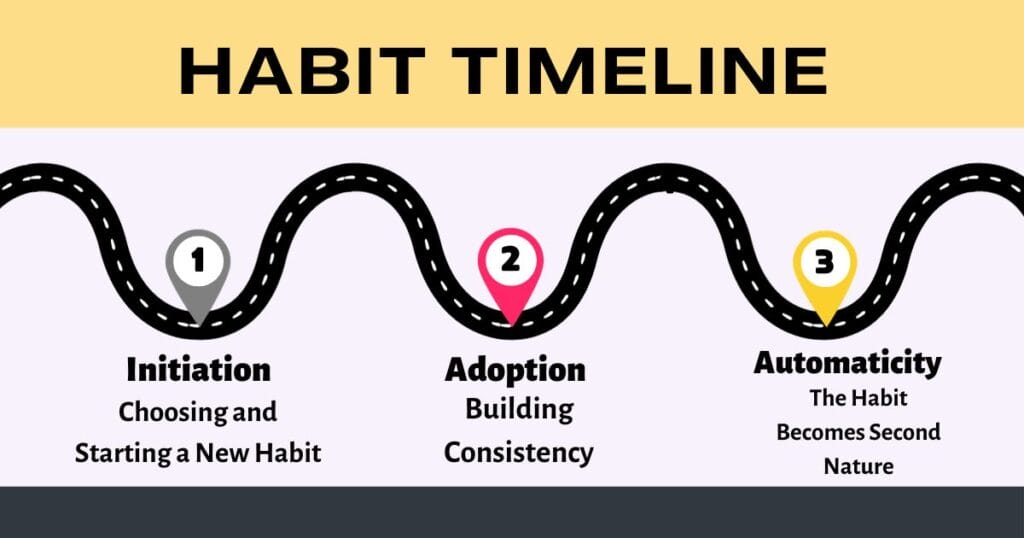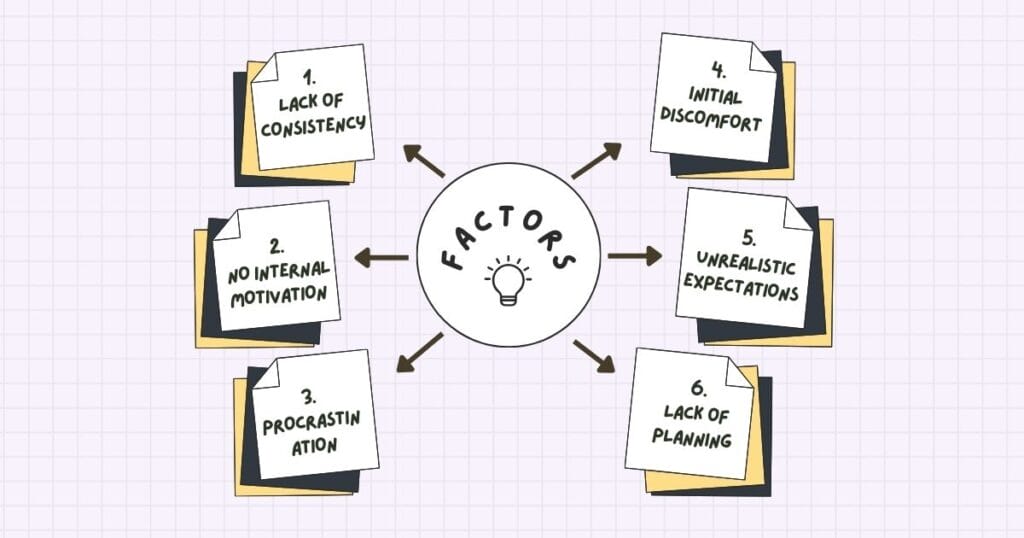In the realm of habit formation, the question of “How long does it take to build a habit?” is still a mystery. Whether you want a healthy lifestyle or boost productivity, understanding the time needed for habit formation is the key to unlocking your full potential.
In this exploration, we’ll delve into the captivating science and psychology behind habit creation, dispel common myths, and equip you with the habit formation timeline to set your course on the path of lasting change.
Table of Contents
What is a Habit?
A habit is any activity or action you perform daily, primarily involuntary. Sometimes, you do not know how to do or perform such an action. Habits become a part of your biological clock.
You may acquire them deliberately. But when habits become your schedule, then they occur unconsciously. If you ever wonder about how long does it take to build a habit? Then don’t stop reading here.
Habit Formation
It is the process by which people develop new habits and behaviors to bring positive change in their lives. When you repeat these habits, they become your routine. Practices are based on the experience of your psychological conditions.
Habit formation is a slow process that depends on a person’s mental and physical health. For this reason, the time needed for building a habit is not fixed.
Maintaining good mental and physical health provides the necessary tools, motivation, and resilience to establish and sustain healthy habits.
On the contrary, challenges in mental and physical health can pose significant barriers to habit formation.
For example, the time needed to make mewing a habit depends on your mental and physical health.
How Long Does it Take to Build a Habit?
In light of details and misconceptions of the 21-day myth discussed in the following blog, it is suggested that time varies for acquiring any habit depending on its nature and type.
There is no fixed amount of time or days for making something a habit. However, according to a study in 2009 by the European Journal of Social Psychology, 18 to 245 days may be sufficient to form something a habit.
Knowing the Science of Habit to Determine its Formation Time
Knowing the science of habits is necessary to understand the habit formation time. It revolves around the concept of classical conditioning.
Ivon Pavlov was the first person who experimented while analyzing the amount of saliva secreted during eating.
Suddenly, he came across the science of habit formation. He concluded his experiment with classical conditioning. It is related to habit formation in the context of how behaviors and responses become automatic and require little conscious thought or effort.
These behaviors and responses will automatically determine the days to form a habit.
Myth Bursting: the 21 Days Misleading Belief
The time frame for making something a habit is often misled with the “21 days myth”. It is a common misconception that it takes 21 days to build a new habit or break an old one.
This belief has been perpetuated in various self-help books, articles, and popular culture. However, this notion needs more scientific evidence. There are many reasons for this, such as
- Habit formation is not fixed or constant
- Context matters
- Lack of scientific evidence
The Habit Formation Timeline
The Habit formation timeline typically involves three general stages that individuals go through when developing a new habit: Initiation, Adoption, and Automaticity.
Understanding these stages can help determine days to form a habit.

1. Initiation – Choosing and Starting a New Habit
It is the initial phase where you decide to adopt a new habit. It begins with recognizing the need or desire for change in your life. You identify a specific behavior or routine you want to incorporate into your daily life.
In this stage, setting clear goals and defining your habits is crucial. What pattern do you want to establish, and why is it important to you? How long to create a habit? A strong “why” and “how” can motivate you during this phase.
- You start by taking small, manageable steps towards your new habit.
- These initial actions serve as the foundation for building the practice.
- Consistency is vital in this stage as you lay the groundwork for what will come next.
2. Adoption – Building Consistency
During the adoption phase, you focus on making your chosen habit a regular part of your routine. This is where you begin to practice the habit consistently and intentionally.
Your focus on a particular behavior will suggest how long it will take to build.
For instance, if you want to develop the secret habits of happiness experts, focusing on their particular habits will determine the days to form their habits.
It’s common to encounter resistance or obstacles during this stage. You may need help to stick to your habit consistently. Following are some of the best strategies for the adoption phase.
- It’s essential to stay committed
- practice discipline and
- Remain patient
- Track your progress and hold yourself accountable
The duration of this phase depends on the complexity of the habit and your commitment. Therefore, this phase can take several days to months.
3. Automaticity – The Habit Becomes Second Nature
The Automaticity phase is the ultimate goal of habit formation. During this stage, the habit becomes ingrained in your daily life, and you perform it almost effortlessly, often without conscious thought.
The total time to reach this phase automatically shows you how long it takes to form a habit.
- Your brain has rewired to accommodate the habit, making it a natural part of your routine.
- You no longer need to exert significant effort or willpower to maintain it.
It’s important to note that reaching automaticity doesn’t mean you should become complacent. It would be best to periodically reinforce the habit to prevent it from fading.
Once a habit reaches the automaticity stage, it becomes a sustainable part of your lifestyle, contributing to overall well-being and productivity. For example, the habit of brushing your teeth will be a part of your life once it reaches automaticity.
Factors Affecting Habit Formation Timeline
Habit building is the most challenging task. It is hard to stop bad habits and form new ones. Various factors affect days to establish a habit.
There are various reasons for such a fact. Some of them are given in the following passage.

I. Lack of Consistency
Are you consistent in your doings? Your answer tells you the reason. Most people need to be more compatible to form new habits. They must follow the set schedule and make a habit at a particular time.
Consistency is the root of multiple habits such as exercise, study and work. Unless you are consistent in your doings, you cannot reach a proximal potential. Work less but daily and you will achieve success. Atomic habits gives much importance to consistent learning and habit formation.
II. No Internal Motivation
Have you ever thought? After watching a motivational video reel or reading some content, you may start to form a habit abruptly.
But within a short period, your motivation level decreases due to building impairs. Try to be internally motivated and have strong willpower to change your habits.
III. Procrastination
Procrastination is the primary cause that leads to difficulty in habit formation. You cannot progress if you delay your actions. Ultimately, it affects days to form a habit.
How long it takes to create a habit highly depends on how proactive you are. Your approach and energy determine the time to make a habit. Generate energy that motivates you for developing habits of high performance and development.
IV. Initial Discomfort
Initial discomfort often affects the time needed to form a habit. Adopting a new habit requires effort, hard work, energy, discipline, and leaving some habitual activities. All this makes you come out of your comfort zone.
If you are willing to change your life by building habits, you are ready to face discomfort for some time. You are going to be rewarded but once you leave your comfort zone.
V. Unrealistic expectations
Your unrealistic expectation also affects days to establish a habit. People often start to form new habits in a short time. They listen to misconceptions of either 21 days, 45 days, or 56 days. But drawing an exact line for days or months to form a habit is hard.
While setting goals, you should think whether they are realistic and achievable or not. Set realistic goals and then expect accordingly.
VI. Lack of Planning
One of the significant issues in habit formation is the need for more planning. It would help if you started any action, including habit building, with a proper plan. For example, when inflation affects consumer spending, you change your buying habits with a proper plan.
Therefore, always make a plan where you can see your progress and future strategies. Also, try to be accountable in asking your growth rate. For example
How will You Adopt Positive Habits in a Given Time?
If you are curious about the time required to establish a habit in a particular time, then follow the following steps to adopt positive habits in a given time.
- Be consistent: Make sure you realize your daily habits.
- Set realistic goals and habits: Form those habits that are real. Goal setting helps you build habits easily.
- Set one habit to form at a time: Don’t opt for many habits at a time because you cannot manage multiple tasks.
- Reward yourself: Enjoy your small and short-term success. It makes you more motivated. A small reward will boost your morale. Understanding how to reward yourself is crucial for your habit-formation journey.
- Know your reason: Why do you want to build a certain habit? Is it a professional habit? How long to form a habit? Try to find the reason and time to build it. Such a practice will compel you to form the habit you want.
- Be accountable: Always ask about your progress in the process. Question yourself for any delay or postponed action while you form habits.
- Remind time and again: Set a mental alarm as well as a digital one. Work so much that the digital clock transforms into a biological clock.
Some other important steps are:
- Set and follow a schedule
- Plan for modification
- Think and search for updated people
- Watch and listen to experts
- Eat proper and healthy food
- Engage yourself in a physical sport
- Be patient
- Work on the right habits
Conclusion
The time required to form something a habit depends on various factors like your mental and physical conditions. It also depends on the types of habits. To successfully form new habits, it is crucial to remain patient, persistent, and adaptable. Celebrate your progress along the way, and don’t be discouraged by setbacks. Over time, with dedication and practice, you can integrate positive habits into your life and experience their long-term benefits.
FAQs
What is the Role of the Brain in Determining Days to Form a Habit?
The brain plays a crucial role in determining days to form a habit. It is the central organ that plays an essential role in forming a habit.
The basal ganglia play a core role in how you make habits. It is a structure in the forebrain. Basal Ganglia controls deliberate action or voluntary movements.
The brain changes your mood, pleasing or annoying, and positive or negative habits. Therefore, how long to establish a habit depends on your brain’s functionality.
How do You Determine Days to Form a Habit via Components of Habit Formation
Interestingly, you can estimate the time for habit formation by knowing various components of habit formation. There can be many habit formation components, but three are most important. These are
I. Context cues
II. Behavioral repetition
III. And The reward
The context is the time, place, or previous action that activates any behavior. The main habit that a person performs is the behavior. The result of such an action, such as a pleasant feeling, is the reward. If you want to form a habit, set rewards to attain that habit.
Now, think about these components and determine how long does it take to build a habit?




